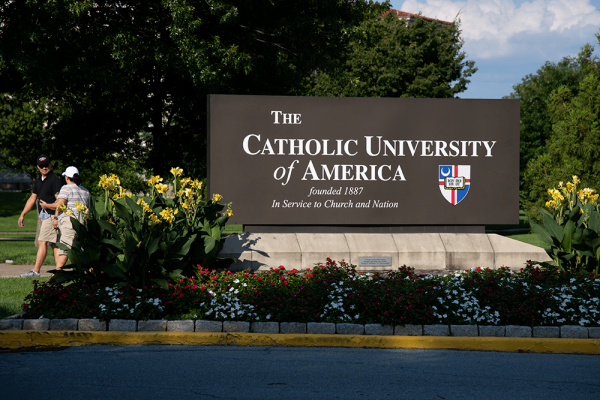Rachel Carbonneau didn’t show up to Catholic University of America in late January planning to talk about abortion. The doula and public health advocate was visiting a class for aspiring nurses, doctors, and other public health professionals to talk about social determinants of health — the ways that economics, community structure, bias, and institutions affect health outcomes. The student-led conversation had touched on a wide range of topics from the opioid crisis, to the fact that Black birthing people in New York are five times more likely than their white counterparts to die in childbirth, to the impact of COVID-19 on placental health.
She knew that many of these topics would be uncomfortable for the class, and she had explicitly told them that they were all free to leave if they were uncomfortable, because if their classmates had questions about “anything from cervical mucus to circumcision,” she said she would be willing to address those matters in discussion.
And then, about two-thirds of the way through the lecture, student Felipe Avila raised his hand and asked about abortion.
Carbonneau knew that this would be delicate territory at CUA, where she’d been a student and a teaching assistant in the early 2000s. “I wasn’t going in blind,” she told Sojourners. She knew that the university shares the Catholic Church’s explicitly anti-abortion beliefs, and that the topic had only become more politically volatile since her days as a student. She tried to swerve away from the question, she said, but Avila persisted. And then he began recording. What Carbonneau didn’t know before taking Avila’s question, is that the student is a spokesperson for Students for Life of America, an anti-abortion group.
In the audio, Carbonneau acknowledges the delicate nature of the topic, as well as Catholic University’s stance on the issue, before going into a discussion on the support she offers to those in need of an abortion. She urges compassion for parents whose abortions, while technically “elective,” are more necessary than the word implies.
“There are a lot of pieces to these puzzles, emotionally and socially,” she is heard saying in the recording.
Within days, CUA fired lecturer Melissa Goldberg, who had invited Carbonneau to speak. The university declined to comment beyond the letter President Peter Kilpatrick disseminated following the release of Avila’s audio on the Daily Signal.
“While we were unable to confirm what exactly was said in the class, we did determine that the speaker’s views on life issues and on the anthropology of the human person were not consistent with our mission and identity as a faithful Catholic university, and that she should not be allowed to address the class again,” the president said in his letter according to Inside Higher Ed. “Now that we have clear evidence that the content of the class did not align with our mission and identity, we have now terminated our contract with the professor who invited the speaker.”
Carbonneau said that no one from CUA administration reached out to her at any point.
Another Catholic school, the University of Notre Dame, had a similar abortion-related conflict recently. Throughout the 2022-23 school year, the first after the Supreme Court overturned Roe v. Wade, sociology professor Tamara Kay complained about severe harassment due to her abortion-rights positions. Kay had hung a sign on her door to let students know her office was a safe place to get information on “ALL Healthcare issues and access,” landing her on Turning Point USA’s “professor watchlist.”
The university — which had known Kay supported abortion rights and promised her that her position was covered by their commitment to academic freedom — failed to do much to stop the harassment, Kay claimed in her complaints. The university, in a statement to The Cut, claimed that it was taking the threats seriously.
While not fired for her position or writings, Kay has said she feels unsupported by the university, whose alumni, donors, and conservative students have urged the administration to effectively censor her. She told The Cut she had been pressured to take down anything that might be construed as “medical advice,” and after she published an abortion-rights op-ed in the Chicago Tribune, in December 2022, Notre Dame President John I. Jenkins, a priest, sent a letter to the editor saying Kay was free to express her views, but that those views were not shared by the university.
The two Catholic institutions represent just two of the various ways religious colleges and universities are responding to the increasingly fraught intersection of academic integrity, religious identity, and social change. Issues like abortion, racial justice, and LGBTQ+ rights often uncover the competing roles universities are asked to play. Many Christian schools have a stated mission both to promote intellectual dialogue and Christian formation, but some schools have taken strong action to exclude voices that express disagreement from their campus.
The latter role is often driven by fear, said John Hawthorne, who has spent almost 40 years in both faculty and administration roles in Christian colleges. Hawthorne, publishing a book on Christian colleges and universities in 2025, says these fears and how they have led to increasing conflict with students’ values and faculty’s academic freedom.
“The change among Christian college students since about 2010 has been remarkable,” Hawthorne said. “The Gen[eration] Z students have a highly attuned ‘BS meter’ and virtually no tolerance for intolerance.”
Faculty too have come up in academic environments more open to exploring and discussing issues once considered taboo.
One of the biggest points of departure, LGBTQ+ rights, is driven by students’ lives, Hawthorne said. Many, if not most, students have queer friends or are LGBTQ+ themselves, and so do not see LGBTQ+ rights or inclusion as a matter of abstract debate. They enter the discussion thinking about people they know. As more teens experience safety and acceptance in the general society, the more they expect that from Christian institutions.
At Baylor University, a Baptist school in Texas, LGBTQ+ students petitioned for a charter to operate as an official student group for over a decade before Baylor resolved to create another group that aligned with the school’s beliefs. Baylor chartered the new group, Prism, in 2022. The university still maintains its official statement on human sexuality, which designates monogamous, heterosexual marriage as the only appropriate setting for sex. Baylor has a long history of trying to maintain its Baptist identity while serving a diverse body of students — especially as it has become more competitive academically and athletically — and at times has managed to inflame both sides at once.
At Seattle Pacific University, a similar statement on human sexuality applied primarily to faculty members and was unenforced for years until a faculty member sued the school for anti-LGBTQ+ discrimination. After tumult on campus, among faculty, and even in the operations of the school’s board, the Free Methodist-affiliated university doubled down on the policy. The university lost students, faculty, board members, and community relationships. As the fight grew more public, students told Sojourners the board became more aggressive in its tactics to fully operationalize its restriction on faculty in same-sex relationships. Students even sued the board for breach of fiduciary duty and the state attorney general opened an investigation into the school, though portions of the lawsuit were later dismissed.
Hawthorne said the gap between the competing values within a university community has grown as social media has opened up influence to conservative activists and media who can use a viral video, like the one of Carbonneau, to resurrect what he describes as the old culture war trope of “Marxist, godless higher education” that these activists want to see purged from Christian colleges.
But sometimes those videos originate from the institution itself, like when Grove City College hosted historian Jemar Tisby in October 2020, after the United States had passed through a summer of intense reckoning with the institutionalized nature of racism. Tisby focuses on Christians and racism in his scholarly work, and by the time he spoke at Grove City, white, conservative Americans had been put on alert to look for “critical race theory” behind any and all discussions of race. A petition circulated calling on Grove City to guard against a “society grounded in wokeness” by examining its diversity policies, curricula, and the voices it allowed in chapel. The furor ended with Grove City’s board appointing a special committee to investigate the “mission-drift” and make recommendations to shore up the school’s conservative identity.
Conservative student groups, like Turning Point USA, have used a battleground mentality to build chapters at state schools as well as a range of liberal arts and religious colleges. Students at the more conservative institutions can use the infrastructure of the institution, including campus publications and alumni networks to practice their activism with plenty of support. Just like more progressive students, they too can agitate, pushing their school in the direction they want.
Avila, the Students for Life of America spokesperson who recorded audio of Carbonneau, said in an opinion piece for The Tower, that it was an “unpleasant experience” listening to Carbonneau. Avila, whose resume includes serving as president of TeenProLifers and the director of communications for National Association of Pro-Life Nurses, wrote that he has “never been the student who sits idle, allowing radical out-of-touch speakers to spread hateful rhetoric” and intentionally leaked the audio to the press. He wrote that he hoped leaking the audio would lead to “real, meaningful change with respect to guests and faculty who embrace the values of the Catholic University of America.”
What grieves Carbonneau, she said, is that universities like CUA are relinquishing something important: a full and meaningful education for their students. Without discussing abortion, she said, it's difficult to learn about the full spectrum of reproductive health care — something students going into public health professions need to understand. No one in the class she visited could initially define “maternal morbidity,” which is a basic component of public health policy. Whatever topics they did cover, were then drowned out by Avila’s stunt.
“The word ‘abortion’ was used to cancel the conversation we were having that day,” she said.
This story was updated on April 15, 2024, to correct that Avila recorded audio of Carbonneau’s lecture; an earlier version of this piece said he “filmed” it.
Got something to say about what you're reading? We value your feedback!








